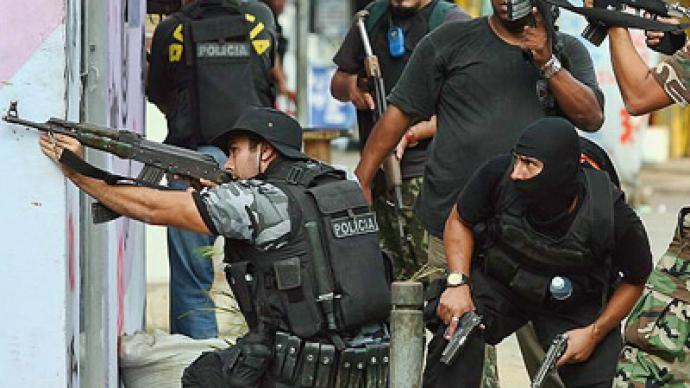Brazilian military raids favelas in Rio de Janeiro

Heavily armed military police raided the slums of Rio de Janeiro following days of heightened violence caused by police clashes with drug gangs.
Officers and armored vehicles targeted the hillside favelas that sit to the periphery of the city, many of which are considered drug gang strongholds.Gang members previously targeted police, including shooting down police helicopters. Such violence is an ongoing problem for Rio, a city set to host matches in the upcoming 2014 FIFA World Cup and later the 2016 Summer Olympics. Pepe Escobar, a Brazil based correspondent for the Asia Times explained the Rio favelas are intertwined through other areas of the city, and within complex topography if the hillsides. The location of the favelas makes entering them more complex for police, as conflict could spread into other neighborhoods. Over the last four decades the police largely ignored the favelas, adding to the problem. Without a police presence the gangs moved it. How to tackle the growing problem has been a key issue for Brazilian forces.“For the last two and a half years more or less in Rio, they started a small program with some kind of peacekeeping police unites. So, they are stationed inside the favelas. They offer sort of protection, it’s like an outpost,” said Escobar. “The local population liked it and wants more; they want the state to actually provide more services to them.”However, the gangs have not been keen on the increased police presence.“It’s a civil war, it’s a mini civil war,” he added. Currently the impact is localized, not all of Rio is affected. The major downtown business district, tourist sites and beaches have not been affected by firefights between police forces and drug gangs. The conflict has been focused in the slums and favelas. It is possible the police have begun increasing their presence and targeting the drug gangs to better ready the city for the upcoming 2013 Confederations Cup, 2014 World Cup and 2016 Olympic games. “I wonder if they can clean up the three major drug gangs in Rio, were talking about 25 or 30 different favelas, more than 400,00 people, in two and a half years,” said Escobar.













